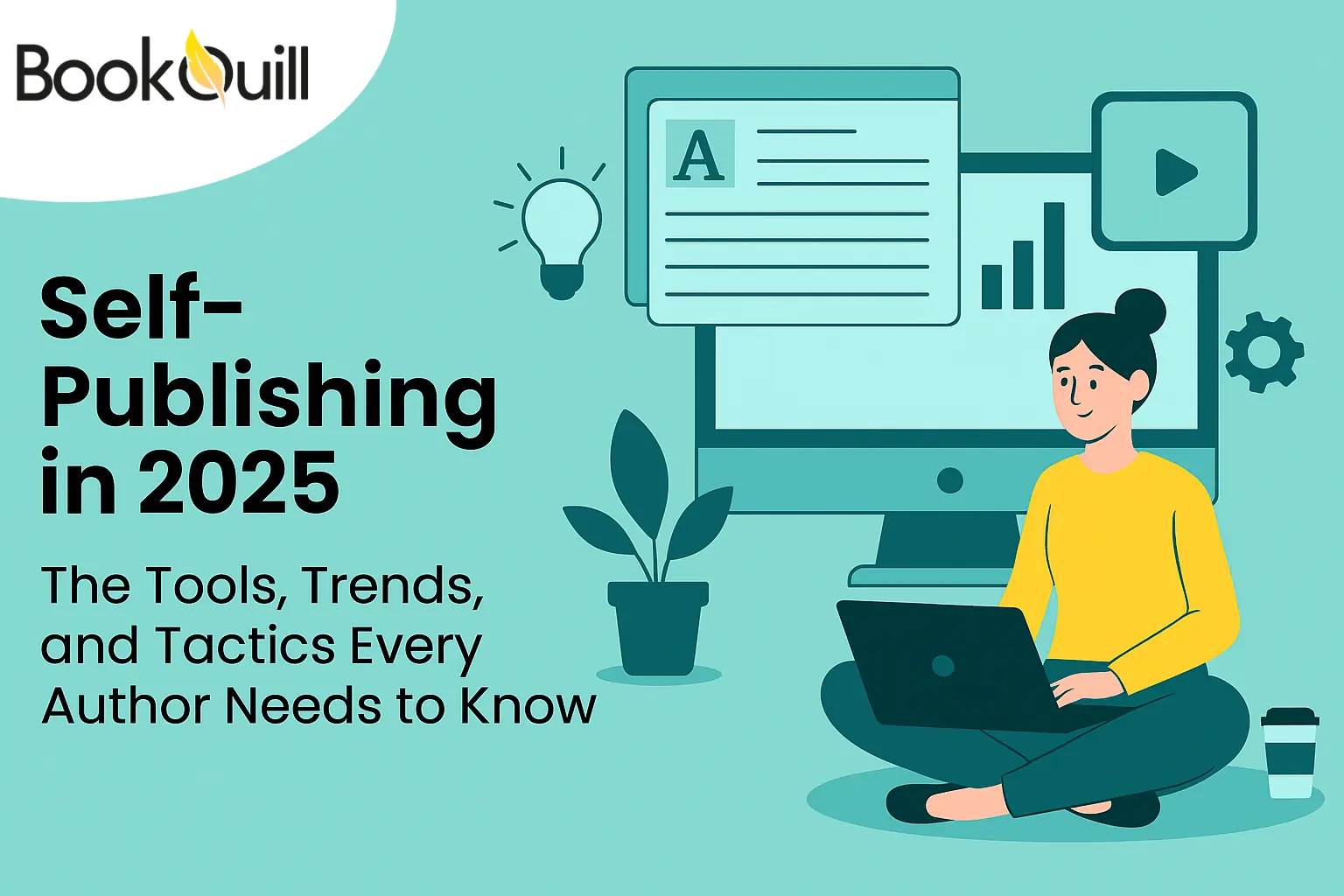Table of Contents
Explore Blogs
Trending on Ebook
The Ultimate Guide to a Successful Book Launch

You must have noticed that the best books with mind-blowing storylines didn’t get the limelight it deserves. The reason behind this is that the owners or publishers didn’t market it well before the book launch.
Launching is not just about putting your book on the shelves of the bookshops; it’s about making sure it becomes famous and the reader waits for its launch to buy. But how can it get popular? The answer is “Marketing” you can also take help from book writing companies.
It is a way through which people learn about your book and get an idea of what they will read after buying it. If you want to make readers go crazy about your book, then here is what you should do!
Is Launching More Like an Event?
Yes, you can call it an event or series of events that publishers plan for the reading audience and paparazzi in which they announce and celebrate the release of your book. In the book launch event, you have to introduce your book to the world, make people curious about the book, and create a platform for ongoing promotion.
-
Why You Should Build Your Team
You can’t do it all alone. A solid team can make a world of difference. Key roles include a publicist to get the word out, a marketer to handle promotional strategies, and a social media manager to keep you active online. The team you have made should estimate your costs for marketing, events, and promotional materials.
Who are you writing for? What’s your message? Your promotional strategies should be centered around these questions. They should craft a valuable message that speaks directly to your target readers.
-
How You Can Plan Your Launching Event
Start by setting a launch date. Give yourself and your team enough time to prepare, but don’t drag it out too long. Create a timeline that includes pre-launch, launch day, and post-launch activities. This timeline is your book launch checklist.
What Book Pre-Launch Activities Should You Do?
Pre-launching a book can be the reason for your book’s success. Here are some pre-launch activities your team should focus on to ensure your book gets the attention of the audience.
-
Create Author’s Platform
Before anything else, you need a solid platform from which to launch. This includes:
1. Website
Create a professional author website. It should have a blog, information about you and your book, and a way for readers to contact you.
2. Social Media
Show your presence on social media platforms like Facebook, Twitter, Instagram, and LinkedIn. Start engaging with your audience early.
3. Email List
Make an email list to keep readers updated on your book’s launch. Use a service like Mailchimp or ConvertKit to manage your list.
-
Announce Your Book
Make the audience excited about your book by announcing the date and time of the book. This can be done through:
1. Social Media Posts
Share your book’s title, cover reveal, and a brief summary. Use visuals that gather readers’ attention.
2. Blog Posts
Write blog posts about the process of writing your book, what inspired you to write the book, and what readers can expect when they turn the pages of the book.
3. Email Newsletter
People who signed up for the newsletter made a list of their emails and sent announcements about the book launch. The content of the email should be about the first look at the cover or a sneak peek of the first chapter.
-
Engage with Your Audience
Interaction with your readers can help you build a loyal following. Here’s how to engage:
1. Host Q&A Sessions
Use platforms like Instagram Live, Facebook Live, or Twitter to answer questions from your audience.
2. Polls and Surveys
Get your audience involved by asking for their opinions on things like cover designs or favorite genres.
3. Beta Readers
Select a group of dedicated beta readers to give feedback on your script. This can help you refine your book before its final release.
-
Plan Your Marketing Strategy
A well-thought-out marketing strategy can make a huge difference. The three best pre-launching book marketing strategies are:
1. Content Calendar
Plan your content schedule leading up to the launch. This includes social media posts, blog entries, email newsletters, and guest posts on other blogs.
2. Advertising
Make a budget and spend on ads, but on the platforms where you can connect with your readers. Facebook and Instagram ads are effective for reaching targeted audiences. Amazon ads can make you more visible directly on the sales platform.
3. Book Trailers
People love to watch reels and short videos, so you have to create a short and engaging video trailer for your book. Share it on social media, your website, and YouTube.
-
Create Promotional Materials
Prepare all the materials you’ll need to promote your book, such as:
1. Press Kit
It should include your book’s cover image, author bio, book synopsis, and sample chapters. Make it easy for journalists and bloggers to write about your book.
2. Graphics
Design promotional graphics such as banners, social media headers, and quote images from your book. Tools like Canva can be very helpful for this.
3. Review Copies
Prepare digital and physical review copies of your book and soft launch it. Don’t you know what a soft launch of a book is? Well, it’s the release of the book for a limited audience. You can even reach out to book bloggers, reviewers, and influencers to request reviews. This will surely make your book successful because their followers will buy it.
-
Track Your Progress After Pre-Launching
If you don’t track your pre-launch activities, how will you know what needs improvement? Use checklists to ensure you’ve covered all your bases. This can include everything from sending review copies to finalizing your book’s cover design.
Monitor your social media engagement, email open rates, and website traffic. Adjust your strategy based on what’s working and what isn’t so that when you launch your book, people are excited and ready to buy it. Tracking your progress helps you understand the effectiveness of your promotional efforts and allows you to make necessary adjustments for a successful launch.
How to Launch a Book
The day of your launch is the moment you’ve been preparing for, and it’s time to pull out all the stops to ensure your book gets the attention. Try these activities in your launch to make it a resounding success.
Host a Book Launch Event
This event is a fantastic way to release your book and engage with your audience. Here’s how to make it memorable:
-
Choose the Right Venue
If you’re hosting an in-person book launch event, select a venue that’s according to your book’s theme. For example, if your book is a historical novel, you might choose a venue with a vintage feel, such as an old library or a historical society.
For a fantasy novel, a location like a themed café or an outdoor garden can make the experience better. A modern venue like a trendy bookstore or a chic art gallery might be perfect for a contemporary thriller. If you can’t afford a book launch party, conduct virtual events on platforms like Zoom, Facebook Live, or YouTube Live.
-
Invite Guests
Your guest list should include friends, family, influencers, media personnel, and your target readers. Send out invitations in advance and follow up closer to the event date.
-
Plan the Schedule
Keep your event organized with a well-planned schedule. Prepare a welcome speech, read the best thoughts and quotes written in the book, have a Q&A session, and a book signing by favorite players or other people who are endorsing. For virtual events, make sure to engage your audience with interactive elements like live polls, calls, and chat.
-
Promote Your Event
Use social media, email newsletters, and your website to promote your event. Create a buzz by sharing sneak peeks and countdowns.
Book Release on All Platforms
Your book must be available for purchase on all planned platforms. Coordinate the release times so your book becomes available simultaneously across different stores such as:
-
Amazon Kindle
For eBooks, ensure your book is live on Amazon Kindle. Set up your author page and make sure your book’s metadata (title, author name, keywords, categories) is accurate.
-
Print Editions
If you’re offering a print version, ensure it’s available on platforms like Amazon, Barnes & Noble, and IngramSpark.
-
Other eBook Platforms
Distribute your book on platforms like Apple Books, Kobo, and Google Play Books to reach a wider audience.
-
Share Behind-the-Scenes Moments
Show your audience behind the scenes of your book launch day to create a deeper connection with your readers. You can post updates throughout the day on social media. Share photos and videos of your launch event, the moment your book goes live, and your reactions. You can also use Instagram stories and reels, Facebook stories, and TikTok to give quick updates.
-
Contests and Giveaways
Run a launch day contest or giveaway. Encourage readers to share your book or leave a review for a chance to win a signed copy or other book-related merchandise.
-
Email Your Subscribers About Launch Day
Your email subscribers are some of your most dedicated supporters. Make sure they’re included in your launch day activities. Send out a special launch day email to your subscribers is a good book launch idea. Include a personal message, links to purchase the book, and exclusive content like a bonus chapter or author insights. You should offer your email subscribers a limited-time discount so that a vast audience can buy your book.
-
Utilize Paid Advertising
Boost your book’s visibility with targeted paid advertising on these platforms:
1. Most Used Social Media
Run targeted ads on Facebook, Instagram, and Twitter. Use interesting visuals and catchy lines in the ad copy to attract readers.
2. Amazon Ads
Set up ads on Amazon to target readers who are browsing similar genres or books. This can help you reach a highly relevant audience.
3. Google Ads
To drive traffic to your book’s landing page or Amazon listing, you should use Google Ads. Don’t forget to add target-specific keywords related to your book’s genre and themes.
-
Issue a Book Launch Press Release
A press release can help you gain media coverage and reach a wider audience. Write a convincing press release that includes all the necessary information about your book, its release date, where it can be purchased, and a brief author bio. Then, send your press release to local newspapers, magazines, online publications, and relevant bloggers.
After that, personalize your pitch to increase your chances of getting coverage. Do a follow-up with journalists and bloggers who received your press release. Offer to provide additional information or set up an interview.
5 Questions that Audience Might Ask in Your Press Release and How You Should Reply!
I) What was your inspiration behind writing this book?
Tell people that the inspiration for writing this book came from your own experiences and the stories you’ve heard from people around you. The characters and plot were born out of a desire to create something meaningful that could connect with people’s lives and perhaps provide a bit of insight or escapism.
II) What is the main message or theme you want readers to take away from your book?
For example, if your launched book is about a love story, clarify whether the main message revolves around love or power. Express your hope that readers can perceive the underlying hope. Through the characters and their journeys, we aim to inspire readers and encourage them to reflect on their own lives in new ways.
III) How did you bring this story to life?
If they ask you this question, start by giving them a detailed outline of the plot and character arcs, which helps you stay on point. Describe to them what your writing routine is and how you usually love to write. Writers say they write in a quiet space for proper focus. Make them believe that your story is authentic by telling them how you do research.
IV) Are any of them based on real people?
While the characters are fictional, you should convey that the story in the launched book is influenced by your observations and experiences. Writing about them felt like getting to know new friends, each with their distinct personalities and struggles.
V) What emotions or experiences do you hope readers will go through while reading your book?
Express the audience how they will feel—joy, excitement, empathy, or introspection. Give them an idea about where the book will take them. You want readers to laugh, cry, and ultimately feel a sense of satisfaction and understanding. At the end of the press release, you should say, “I hope the book leaves you with something to ponder and discuss long after you turn the last page.”
Analyze Your Launch Day Results
Review your launch day activities and results to learn what worked and what didn’t through these ways:
-
Sales Data
Analyze your sales data to see how well your book performed. Identify any trends or patterns. If you find low sales after a book launch in a particular region, consider transporting the inventory of books to where demand is higher or try to engage the audience, thereby hosting local events or social media.
-
Engagement Metrics
Look at your social media and email engagement metrics. Which posts or emails had the highest engagement? Develop such posts again with a twist to keep your audience interested for a longer period.
-
Feedback
Gather feedback from your audience and team. What did they enjoy about the launch? What could be improved? Use this feedback to refine your future marketing efforts, ensuring you highlight the aspects your audience loves and address any concerns they raise.
Post-Launch Activities
Your work isn’t done once the book is out. Ongoing efforts will help sustain interest and drive sales over time. Here’s a detailed look at the after-book launch activities you should follow:
-
Continue Engaging with Your Audience
Keep the conversation going with your readers by posting each day on social media and responding to their comments and messages. Share news about your book’s success, upcoming events, and more.
-
Gather and Respond to Reviews
Reviews can impact your book’s success more than you can imagine. Ask your readers through newsletters or write a request at the end of the book for a review on these platforms:
1. Amazon and Goodreads
Check for reviews on Amazon and Goodreads regularly. Thank positive reviewers and address any constructive criticism professionally.
2. Social Media Mentions
View social media for mentions of your book release. Share positive reviews and respond to readers who tag you in their posts.
3. Book Blogs
Keep an eye on bloggers who write about books of your genre, and if they have reviewed your book, share their reviews on your social media. And appreciate their support.
4. Give a Positive Response to Criticism
Take note of constructive feedback and consider it for your future writing projects. Respond professionally to any critical reviews if appropriate.
-
Continue Promoting Your Book
Your work doesn’t stop on launch day. Continue promoting your book even after it becomes the talk of the town. How so?
1. Ongoing Social Media Posts
Keep sharing quotes, fan art, behind-the-scenes looks, and updates on any upcoming events or projects related to your book.
2. Interviews and Guest Posts
Schedule interviews on podcasts and YouTube channels. Hire ghostwriters to write a blog on your book.
3. Book Clubs and Discussion Groups
Engage with book clubs and discussion groups. Join their discussions about your launched book, either virtually or in person.
-
Schedule Book Signings and Events
Continue to promote your book through events like:
1. Local Bookstores and Libraries
Arrange book signings and readings at local bookstores and libraries. These events allow you to meet readers in person and create a personal connection.
2. Festivals and Conferences
Attend literary festivals, writing conferences, and book fairs. Participate in panel discussions, workshops, and networking events to promote your book and meet industry professionals.
3. Virtual Events
Host virtual events such as webinars, live Q&A sessions, and virtual book club meetings to reach a global audience without geographical constraints and make your book famous worldwide.
-
Pursue Media Coverage
Ongoing media coverage can keep your book in the public eye. You should send after-success press releases for the book launch, such as those about reaching a sales milestone, winning an award, or upcoming events. Take each press release to the relevant media outlet. Pitching yourself for interviews on podcasts, radio shows, and blogs and let published guest posts or articles for magazines and websites that align with your book’s genre or themes.
Plan and Promote Follow-Up Projects
Keep your audience engaged by hinting at future projects, which are:
- Share teasers and updates about your next book. This can include excerpts, cover reveals, and behind-the-scenes content. Create anticipation among your readers.
- If your book is part of a series, promote the next book. Keep readers informed about the release date and progress of the upcoming book.
- Develop and promote related content, such as short stories, novellas, or companion guides. This keeps your readers engaged and invested in your work.
Your work isn’t done once the book is out. Continue promoting your book with long-term strategies. Engage with your audience through book clubs and discussion forums. Start planning your next project and future launches.
Wrap Up
Launching a book isn’t just about putting it on shelves—it’s about making sure everyone knows it’s there. Marketing is key to creating buzz and anticipation. Your launch event should be a celebration that introduces your book, piques the audience’s curiosity, and makes people promote your books on their online platforms.
Building a strong team is necessary; they’ll handle everything from publicity to social media, ensuring your message reaches your target audience. Pre-launch activities like building an author’s platform and engaging with readers through social media and email lists lay the groundwork for a successful launch.
Plan carefully, track your progress, and adjust your strategy based on what works. Remember, a book launch is a big event, so make it memorable and keep the momentum going post-launch to sustain individuals’ interest and drive sales.




